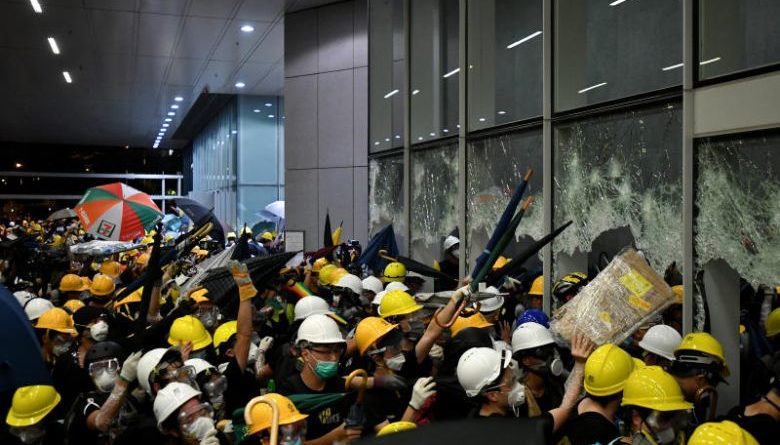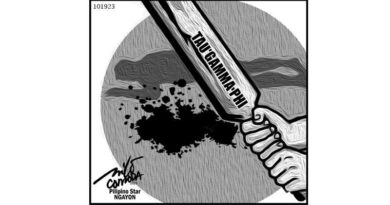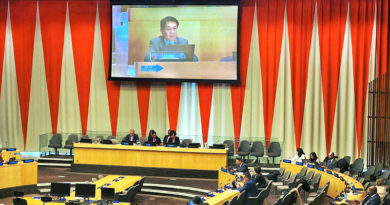China and Britain in war ….. over Hong Kong
Protesters bring supplies into the Legislative Council complex on July 1, 2019.ST PHOTO: LIM YAOHUI
.
China and Britain locked in war of words over Hong Kong after protests in the city
.
UK summons China envoy after he chides nation for interfering in domestic affairs
.
China and Britain are locked in a worsening diplomatic row over Hong Kong, after the United Kingdom summoned the Chinese ambassador and repeated its warning of serious consequences if Beijing defied the “one country, two systems” agreement.
Foreign Secretary Jeremy Hunt yesterday denied that he backed the violent protest in the city on Monday night, but stressed that the Hong Kong issue “isn’t something that we would just gulp and move on”.
Speaking on BBC Radio, he declined to elaborate on what Britain would do if China did not honour the agreement, but said “you keep your options open”.
–THIS SPACE BELOW IS RESERVE FOR YOUR ADVERTISEMENT –

.
The top British diplomat has been caught in an escalating war of words with Beijing after he warned of repercussions if China did not honour the Sino-British Joint Declaration, signed in 1984 allowing Hong Kong to enjoy a high degree of autonomy for 50 years after the handover in 1997.
Earlier, he said that he understood the reason for the anger in Hong Kong, which stemmed from a fear that people’s basic freedoms were under attack.
The remarks sparked a stern rebuke from China, whose Foreign Ministry spokesman on Wednesday accused Mr Hunt of “fantasising in the faded glory of British colonialism and in the bad habit of gesticulating while looking down on other countries’ affairs”.
.
–THIS SPACE BELOW IS RESERVE FOR YOUR ADVERTISEMENT –

The Chinese government lodged an official complaint and later ordered its ambassador in London to hold a news conference during which he chided Britain for interfering in his country’s domestic affairs.
Ambassador Liu Xiaoming also warned that Britain’s support for “law-breaking people” who stormed the Hong Kong Legislative Council building on Monday night had damaged the relationship between China and Britain.
CLEAR CONDEMNATION OF VIOLENCE
Let me (make) clear what I said. I said that I condemned, and we, as the United Kingdom, condemn, all violence, and that people who supported the pro-democracy demonstrators would have been very dismayed by the scenes they saw.
BRITISH FOREIGN SECRETARY JEREMY HUNT
BRITAIN HAS TAKEN WRONG PATH
China has responded to Mr Hunt’s mistaken statements about Hong Kong, and China’s response also applies to similar statements made by other officials of the British government. For the time being today, I will restrain myself and won’t say any more. But if certain people in Britain obstinately stick to the wrong path and keep repeating their mistakes, then I fear I may have more to say.
CHINESE FOREIGN MINISTRY SPOKESMAN GENG SHUANG
The UK Foreign Office reacted by summoning Mr Liu for a dressing-down, denouncing his remarks as “unacceptable and inaccurate”.
China has increasingly been critical of what it has described as Western instigation to stir trouble in Hong Kong.
–THIS SPACE BELOW IS RESERVE FOR YOUR ADVERTISEMENT –

.
An editorial in the official English-language China Daily on Wednesday said “the ideologues in Western governments never cease in their efforts to engineer unrest against governments that are not to their liking, even though their actions have caused misery and chaos in country after country in Latin America, Africa, the Middle East and Asia”.
“Now, they are trying the same trick in China. The aim is simple, as is the strategy: They are trying to exploit Hong Kong’s different system and its proximity to the Chinese mainland to instigate unrest against the SAR government as a means to put pressure on the central government,” it said, referring to the government of the Hong Kong Special Administrative Region.
Hong Kong Chief Executive Carrie Lam has vowed to take action against those who broke into the Legislative Council building on Monday night, and at least 13 people have been arrested so far in relation to the protests.
There were fears that Monday night’s violence would give Beijing a reason to send in troops to maintain order. A Chinese army-affiliated newspaper published pictures of a week-old military drill in Hong Kong a day after the violence, a move seen as a warning by China.
However, a Chinese Communist Party source told The Straits Times that the central government has no plans to mobilise Hong Kong-based People’s Liberation Army soldiers or send more men there.
“Hong Kong can handle the situation by itself,” said the source, who asked for anonymity as he is not authorised to speak to the media.
–THIS SPACE BELOW IS RESERVE FOR YOUR ADVERTISEMENT –

WHAT’S BEHIND THE DIPLOMATIC FEUD
HONG KONG • The unprecedented wave of anti-government protests in Hong Kong has sparked a rapidly escalating diplomatic feud between China and the city’s former colonial ruler Britain.
Hong Kong was returned to China in 1997 under a handover agreement that guaranteed the territory certain levels of autonomy and freedoms unseen on the mainland – and that “one country, two systems” deal is at the centre of the row between London and Beijing.
–THIS SPACE BELOW IS RESERVE FOR YOUR ADVERTISEMENT –

What is one country, two systems?
Hong Kong was ceded to Britain by China in the mid-1800s. But following lengthy negotiations in 1898, London and Beijing agreed on a deal that would see it handed back to China in 99 years.
In 1984, a joint declaration was signed by then British Prime Minister Margaret Thatcher and then Chinese Premier Zhao Ziyang, under which Hong Kong would return to China in 1997 and be governed under a “one country, two systems” doctrine that would give it a special status for 50 years.
–THIS SPACE BELOW IS RESERVE FOR YOUR ADVERTISEMENT –

What is special about Hong Kong’s status?
The joint declaration said that Hong Kong “will enjoy a high degree of autonomy, except in foreign and defence affairs”, and would have its own judicial, executive and legislative systems.
Pre-1997 laws would “remain basically unchanged”, and the locals would make up the city’s leadership structure.
It would also have an independent trade, finance and Customs status, and there would be “free flow of capital” – unlike on the mainland.
Private property and foreign investments would have legal protection.
–THIS SPACE BELOW IS RESERVE FOR YOUR ADVERTISEMENT –

What about freedoms?
The declaration stated explicitly that the “social and economic systems in Hong Kong will remain unchanged”, and rights will be guaranteed.
These included freedoms of speech, the press, of as-sembly and association, of strike, and of academic research and religion.
This meant that Hong Kong, while a part of China, would have a degree of freedom unseen by citizens on the mainland.
–THIS SPACE BELOW IS RESERVE FOR YOUR ADVERTISEMENT –

Has the agreement held?
Hong Kong continues to enjoy its special status more than two decades after its return to China, but criticism of Beijing’s policies in the city has grown.
Pro-democracy campaigners accuse the Chinese government of encroaching on the freedoms enshrined in the handover agreement by interpreting Hong Kong’s Constitution – the Basic Law – to muzzle criticism and keep opponents out of the city’s legislature.
Fear and anger among many over the Chinese government’s tightening grip spilled over last month as millions marched to oppose a proposed law that would allow extraditions to the mainland.
–THIS SPACE BELOW IS RESERVE FOR YOUR ADVERTISEMENT –

What sparked the current diplomatic feud?
The 1984 declaration was registered with the United Nations as a treaty, but Beijing has described it in recent years as a “historical document” that is not binding.
Britain, however, insists that it is.
Following violent clashes between protesters and police in Hong Kong in recent weeks, Britain reminded China of its obligations to protect freedoms in Hong Kong and to not use the protests as a “pretext for repressions”.
British Foreign Secretary Jeremy Hunt warned of “serious consequences” if the handover terms were violated.
China, however, has swatted away expressions of concern and criticism from Britain as “gross interference” in its internal affairs.
The Foreign Ministry in Beijing accused Mr Hunt of “fan-tasising in the faded glory of British colonialism”.
AGENCE FRANCE-PRESSE
–THIS SPACE BELOW IS RESERVE FOR YOUR ADVERTISEMENT –

WAR OF WORDS: HOW SPAT BETWEEN CHINA AND UK ESCALATED
June 25
“We remain very concerned with the situation in Hong Kong. I today urge the Hong Kong SAR government to establish a robust, independent investigation into the violent scenes that we saw.” – Foreign Secretary Jeremy Hunt speaking in Parliament, adding Britain will ban export of tear gas and rubber bullets to Hong Kong after clashes between protesters and the police.
–THIS SPACE BELOW IS RESERVE FOR YOUR ADVERTISEMENT –

June 30
“Recent protests in Hong Kong make it even more important on the anniversary of the handover to reiterate that the UK Government’s commitment to the Sino-British Joint Declaration is unwavering. It is a legally-binding treaty and remains as valid today as it did when it was signed and ratified over thirty years ago.” – Mr Hunt in a statement.
–THIS SPACE BELOW IS RESERVE FOR YOUR ADVERTISEMENT –

July 1
“Away from campaigning want to stress UK support for Hong Kong and its freedoms is UNWAVERING on this anniversary day. No violence is acceptable but HK people MUST preserve right to peaceful protest exercised within the law, as hundreds of thousands of brave people showed today.” – Mr Hunt on Twitter while campaigning to be the Conservative Party’s next leader.
“Recently Britain has continuously gesticulated about Hong Kong, flagrantly interfering. We are extremely dissatisfied with this and resolutely opposed. We urge Britain to know its place and stop interfering in any form in Hong Kong matters and do more for its prosperity and stability rather than the opposite.” – Chinese foreign ministry spokesman Geng Shuang at a daily briefing.
–THIS SPACE BELOW IS RESERVE FOR YOUR ADVERTISEMENT –

July 2
“The UK signed an internationally binding legal agreement in 1984 that enshrines the one country two systems rule, enshrines the basic freedoms of the people of Hong Kong and we stand four square behind that agreement, four square behind the people of Hong Kong. There will be serious consequences if that internationally binding legal agreement were not to be honoured.” – Mr Hunt to the BBC
“None of us supports the violence we saw on TV last night but we do understand the reason for people’s anger and the reason for people’s fears that their basic freedoms are going to be taken away.” Mr Hunt while campaigning in Belfast.
–THIS SPACE BELOW IS RESERVE FOR YOUR ADVERTISEMENT –

July 3
“He (Hunt) seems to be fantasising in the faded glory of British colonialism and in the bad habit of gesticulating while looking down on other countries’ affairs. I need to re-emphasise that Hong Kong has now returned to its motherland. The rights and obligations related to the British side under the declaration have all been fully implemented. The UK at every turn considers itself as a guardian which is nothing but a delusion. I want to ask Mr Hunt…during the British colonial period was there any democracy to speak of in Hong Kong?” – Chinese foreign ministry spokesman Geng Shuang at a regular briefing, adding that China has complained to London.
“The people of Hong Kong are perfectly within their rights to be very sceptical, very anxious about proposals for extradition to the mainland that could be politically motivated, that could be arbitrary and could infringe their human rights. So yes I do support them and I will happily speak up for them and back them every inch of the way. And I would stress to our friends in Beijing that the ‘one country, two systems’ approach has worked, is working and should not be cast aside.” – Former foreign secretary Boris Johnson, who is vying with Mr Hunt to be Britain’s next prime minister, in an interview.
“I have raised my concerns directly with Chinese leaders. It is vital that Hong Kong’s high degree of autonomy and the rights and freedoms set down in the Sino-British Joint Declaration are respected.” – British Prime Minister Theresa May in Parliament.
–THIS SPACE BELOW IS RESERVE FOR YOUR ADVERTISEMENT –

July 4
“I think it’s totally wrong for Jeremy Hunt to talk about freedom. This is not a matter about freedom. It’s a matter about breaking laws in Hong Kong. It’s very disappointing for senior officials of his calibre to show support for these law-breaking people. I think the relationship in a way has been damaged by the interference of the British government in Hong Kong.” – Chinese Ambassador to the UK Liu Xiaoming at a press conference.
“Let me be clear what I said. I said that I condemned, and we as the United Kingdom, condemn all violence and that people who supported the pro-democracy demonstrators would have been very dismayed by the scenes they saw.” – Mr Hunt while giving a radio interview
“China has responded to Mr Hunt’s mistaken statements about Hong Kong, and China’s response also applies to similar statements made by other officials of the British government. For the time being today, I’ll restrain myself and won’t say anymore. But if certain people in Britain obstinately stick to the wrong path, and keep repeating their mistakes, then I fear I may have more to say.” – Chinese foreign ministry spokesman Geng Shuang.
Tan Dawn Wei China Bureau Chief In Beijing
–THIS SPACE BELOW IS RESERVE FOR YOUR ADVERTISEMENT –


All photographs, news, editorials, opinions, information, data, others have been taken from the Internet..aseanews.net | [email protected]









